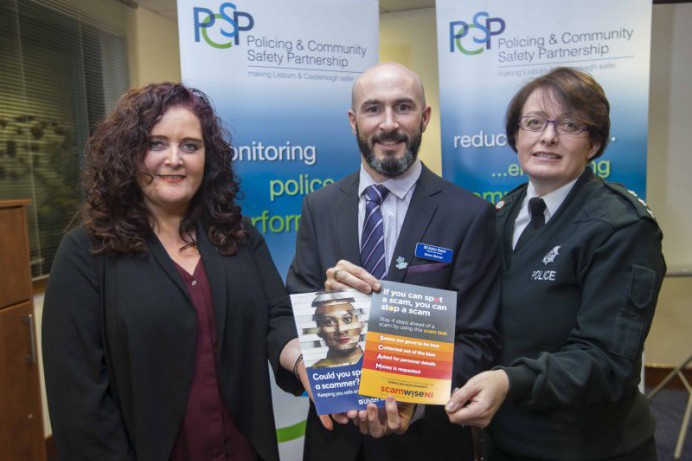Neighbourhood Watch Co-ordinators getting safe on-line
November 21, 2016
Lisburn & Castlereagh Policing and Community Safety Partnership (PCSP) in collaboration with PSNI and the Ulster Bank hosted a Neighbourhood Watch Co-ordinators evening recently to highlight how to keep safe on line especially whilst banking. This event coincided with the introduction of the scam wise initiative which was launched on the same day this event was held. Co-ordinators were also updated on policing issues across the district on various issues including burglaries, the use of the 101 non-emergency telephone number and policing resources.
In the first six months of this year there has been one million cases of financial fraud across the UK involving online and phone banking which reflects an increase of 53% on the same period last year. One in 10 people have been the victim of a cyber-attack on their credit or debit card in the last year with an incident occurring every 15 seconds.
There are 5 key points to consider if you think you are being scammed:
- Never disclose security details
- Don`t assume an email, text or phone call is genuine
- Don`t be rushed
- Listen to your instincts
- Stay in control
Speaking about the neighbourhood watch event, Lisburn & Castlereagh PCSP Chairman, Alderman Michael Henderson said, “The latest figures highlight that financial fraud is increasing significantly over the past year. It is imperative on all of us to safe guard our finances but especially the finances of elderly relatives who may not be alert to the latest scams and how best to protect themselves on line. I welcome the latest PSNI launch of the scam wise initiative and the partnership working of Ulster Bank in providing valuable information on how best to protect ourselves.”
Chief Inspector Lorraine Dobson of Lisburn & Castlereagh police said, “The internet offers amazing opportunities to people but it also poses risks. We would encourage everyone to start making every online interaction safer by following a few simple steps:
• Review the passwords you use on your online accounts: Make sure they’re strong enough and that you’re not using the same ones for more than one account. Consider how you’re going to remember them all – such as using an online password safe.
• Check your social media privacy settings. Make sure your information and updates are seen only by those you trust.
• Update your operating system and software programs/apps on your computer, mobile phone and tablet if you’ve been prompted to do so. It takes only a few minutes and with your mobile devices, you can even do it while you’re asleep.
• Back up your information – using the cloud is a great way to save all your documents, photos, music, emails and other irreplaceable files.
• Check that your internet security software and apps are up to date and switched on.
• If you have children, think about whether you’re doing enough to help ensure they’re staying safe online.
• If you’ve lost money report it to Action Fraud, the UK’s national fraud reporting centre by calling 0300 123 20 40 or by visiting www.actionfraud.police.uk If you are a victim of online abuse or harassment, you should report it to your local police force.
• Take a few minutes to read the expert, easy-to-follow, free advice on all of these and considerably more subjects at www.getsafeonline.org.”
